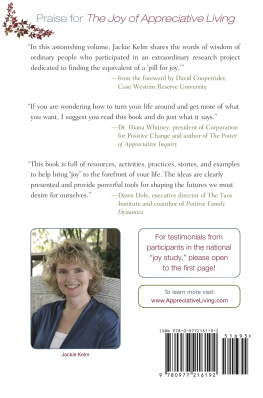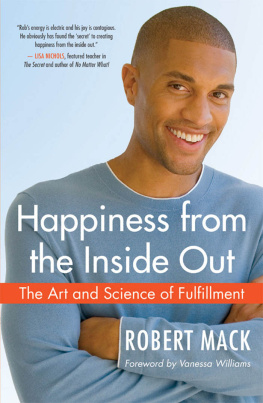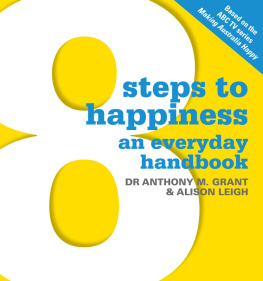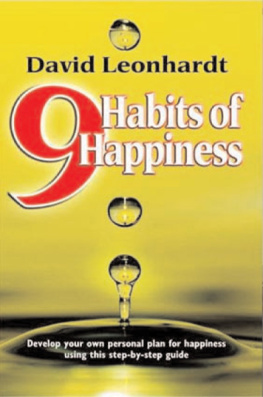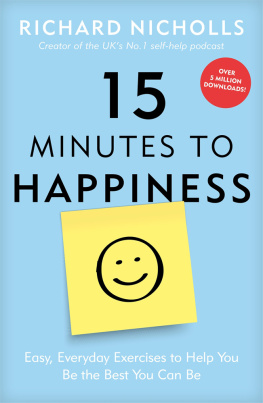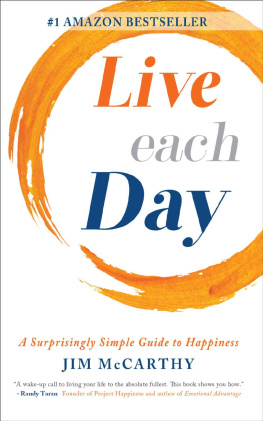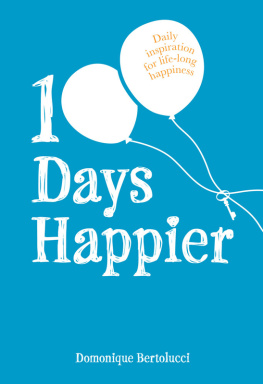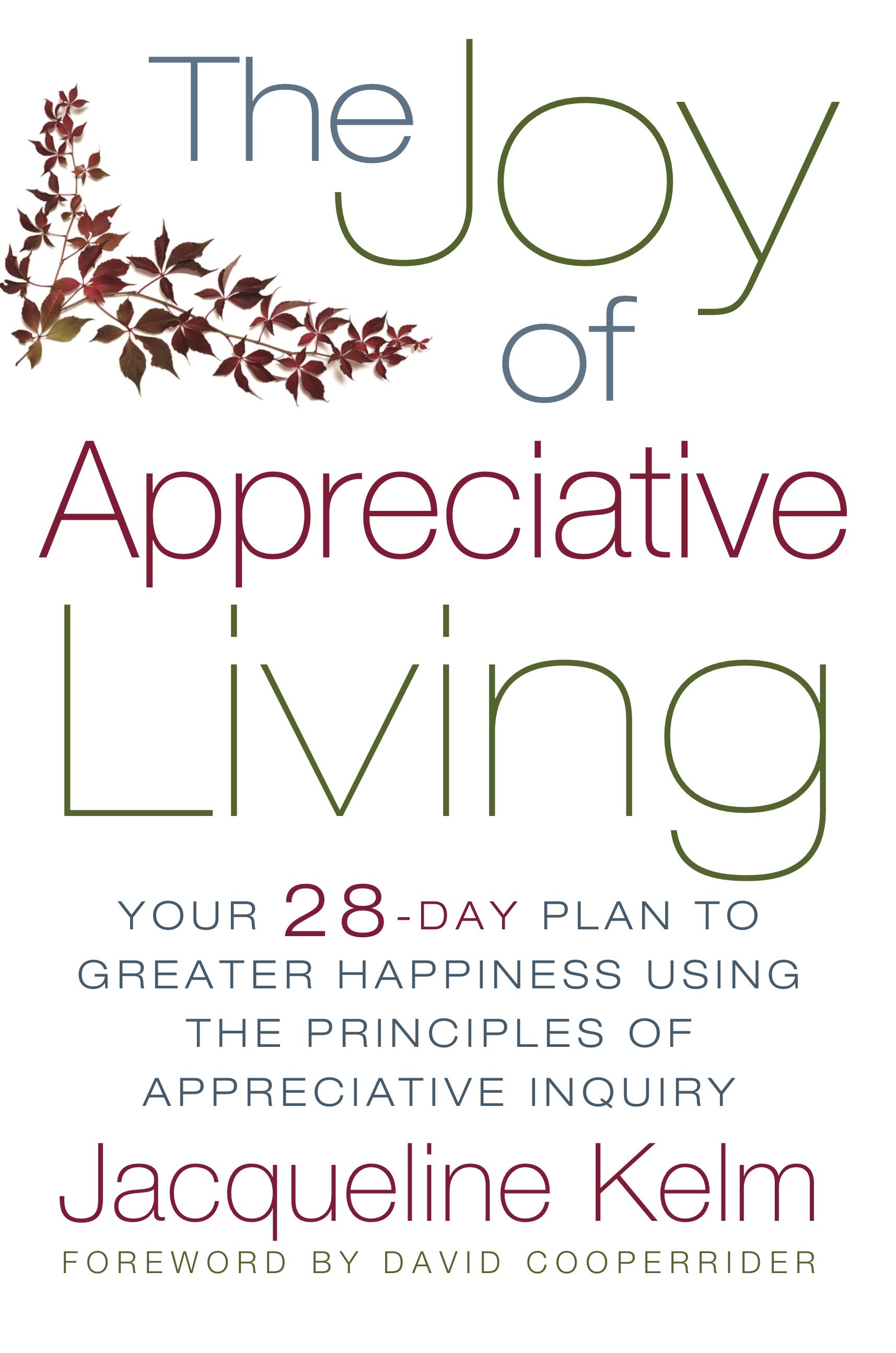Copyright 2020 by Jacqueline Kelm First Electronic Edition
All rights reserved. No part of this book may be reproduced, scanned, or distributed in any printed or electronic form without permission.
This book is available at special quantity discounts for bulk purchase for sales promotions, premiums, fund-raising, and educational needs. Special books or book excerpts also can be created to fit specific needs. For details, email .
For information on Appreciative Living workshops, CDs, and other materials, please visit:
www.AppreciativeLiving.com
Library of Congress Cataloging-in-Publication Data
Kelm, Jacqueline Bascobert.
The joy of appreciative living: your 28-day plan to greater happiness using the principles of appreciative inquiry / Jacqueline Kelm.
p. cm.
Includes bibliographical references.
Print ISBN 978-0-9772161-9-2
1. Gratitude. 2. Joy. 3. Happiness. 4. Positive psychology. I. Title.
BF575.G68K45 2009 2008040674
152.4'2dc22
Book design by Jennifer Ann Daddio/Bookmark Design & Media Inc.
Cover design by Lee Fukui
eBook created by Kelley Creative
Neither the publisher nor the author is engaged in rendering professional advice or services to the individual reader. The ideas, procedures, and suggestions contained in this book are not intended as a substitute for consulting with a physician. All matters regarding your health require medical supervision. Neither the author nor the publisher shall be liable or responsible for any loss or damage allegedly arising from any information or suggestion in this book.
While the author has made every effort to provide accurate telephone numbers and Internet addresses at the time of publication, neither the publisher nor the author assumes any responsibility for errors, or for changes that occur after publication. Further, the publisher does not have any control over and does not assume any responsibility for author or third-party websites or their content.
{ c ontents }
Part One: What You Need to Know
Part Two: What You Need to Do
Appendices
{ Foreword }
An Inquiry into Joy
David Cooperrider
I love the word joy, and it immediately reminds me of a story, partly unsettling but enormously telling. A colleague in the positive psychology movement talks about it as the Beethoven Factor:
There stood Beethoven, gravely ill and totally deaf. Eyes closed, he kept conducting the orchestra even after they had ceased their performance and the audience had risen to its feet in thunderous applause. As a singer stepped from the choir to turn him around to see those whose shouts of bravo resonated throughout the concert hall, tears of elation filled his eyes. Perhaps the worst loss a composer could experience had been the catalyst for a remarkable adaptive creativity that allowed him to transcend his tortures to become immersed in the thrill of conducting the premiere of his Ninth Symphony, the Ode to Joy.
At that moment, and not only in spite of but because of the way he related to his adversity, Beethoven experienced a moment to rejoice that inspires us all. Why? Because this story reminds us that human flourishing is not determined by external circumstanceseven bad situations can be related to in ways that make us happier, more alive, and more content than we ever imagined possible. We participate, as makers of meaning, in the creation and magnification of joy: We are all sculptors, authors, and composers. Our lives, quite simply, are our most precious projects. And a life of joyif we want itis ours to cultivate and to cherish, to express and spread, and to discover and design. This is the message of The Joy of Appreciative Living.
In this astonishing volume, Jackie Kelm shares the words of wisdom of ordinary people who participated in an extraordinary research project dedicated to finding the equivalent of a pill for joy. Only there were no pills. Only questions and inquiries, powerful positive questions, which, taken in easy doses each day, created journeys of joy with progressive upward spirals. The continuing expansion of joy in peoples liveseven breaking the ceiling of so-called happiness set pointswent on for months and is still continuing, way beyond the first twenty-eight-day intervention. I was shocked when the final six-month results came in, writes Jackie. The numerical data from the study was incredible.... I knew I had found it: the closest thing yet to a joy pill.
I know Jackie Kelmshe is an amazing student of lifeand I am sure her eyes were sparkling when she wrote those words. I was privileged to teach and work with Jackie years ago when she was an MBA student studying economics, finance, and business strategy. She was the most curious and serious MBA student I ever encountered in all my years of teaching at the Weatherhead School of Management at Case Western Reserve University. I say all this because Jackie has combined all the analytic talent of an economist and all the pragmatic talent of a business manager to approach the seemingly unapproachable topic of joy in a way that makes it accessible, real, and absolutely pragmaticno empty promises or ethereal mirages here!
The subtitle of this book, Your 28-Day Plan to Greater Happiness Using the Principles of Appreciative Inquiry, is a bold assertion, but it is true. Change, even dramatic change and transformation, is easier than we ever thought beforewhen it is approached in a positive, life-centric, appreciative way.
What Jackie Kelm does in this volume is to give us a method, a powerful set of tools, to make this kind of change an easy and accessible part of our lives. She does it by extending perhaps the most important principle of Appreciative Inquiry (AI), which says that human systems move in the direction of what they most persistently, authentically, and systematically ask questions about. In short, inquiry into joyasking when is it most alive in us... or asking whats the smallest thing we can do today to increase the joy we want... or asking what does it look like in the future ideal joy-filled lifeis the discovery spirit that will fill our lives with more joy, more possibility, than we ever thought possible. Appreciate joy, for what we appreciate appreciates.
This was Beethovens secret. Composing a piece of music is a lot like inquiry. The topic he chose? It was Ode to Joy. Beethoven became what he focused on and studied, and so do we. His tears of elation were not because of the thunderous applause; in fact he could not hear it at all.
He thrived because he made a choice.
Read this book with care. Its more powerful than a pill. Take notice of moments of joy, especially the small ones. Study how joy suspends gravity. See if it has anything to do with beaming, shining, and glowing. Treasure the daily questions Jackie lifts up. Wonder about their possibilities. Delight in the joy of others. And continuously ask yourself: What happens to my relationships, indeed to the whole world around me, when I act, speak, and inquire from a place of joy?
Professor David Cooperrider
Case Western Reserve University
2008
{ Introduction }
When I chose to laugh for no reason or look for the beauty in everyday experiences, I felt my spirit rise. I felt released from an anchor, allowing the day to bring joy rather than chasing after it. It is like chasing butterflies. When you run after them they are elusive. When you sit still amid flowers they alight upon you.
Study participant
Let me be brief: All my life I wanted joy and I wanted it right away. If there had been a pill for joy, I would have taken it. I had been desperately seeking happiness my entire existence and had left a stream of self-help books, workshops, twelve-step programs, psychotherapists, and healers in my wake. And the draft was deep.

